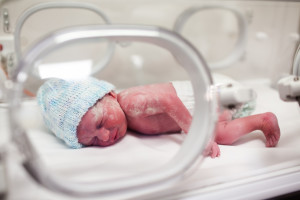 Few parents expect it, but between 10 and 15 percent of all babies born in the United States require special care in the NICU. NICU stands for Neonatal Intensive Care Unit. It is a special unit for preterm babies which are born very early or very ill. These infants are fragile and will need special medical attention and an advanced level of care after birth.
Few parents expect it, but between 10 and 15 percent of all babies born in the United States require special care in the NICU. NICU stands for Neonatal Intensive Care Unit. It is a special unit for preterm babies which are born very early or very ill. These infants are fragile and will need special medical attention and an advanced level of care after birth.
Each baby is evaluated individually by a medical team to determine if there is a need for NICU care. Newborns with these following serious diagnoses are generally admitted to the NICU:
• Prematurity (babies born before 37 weeks of pregnancy)
• Early term infants (babies born between 37-39 weeks of pregnancy)
• Low birth weight (babies that weigh less than 5.5 pounds)
• Sepsis (serious infections)
• Respiratory Distress Syndrome
• Heart problems
• Congenital anomalies
• Respiratory failure
• Birth defects
• Trauma
• Seizures
What to expect in the NICU
Everything in an NICU is different and can be frightening for parents, but knowing what to expect can help parents feel less afraid.
While in NICU, babies will be placed in enclosed, see-through plastic cribs called incubators. These incubators are designed to:
• Keep the babies warm. They will not need to be in blankets because the incubator is heated. However, they will usually have on caps to keep their heads warm.
• Decrease the risk of an infection and illnesses which can be more harmful for premature babies.
• Control the moisture so the babies do not lose water or become dehydrated.
Inside the incubators there will be wires attached to the babies which monitor the baby’s breathing, heart rate, blood pressure and temperature at all times. The babies may also have tubes attached which provide fluid, oxygen or medicines. Additionally, premature and critically ill newborns often have respiratory complications and may require a respirator (breathing machine).
Visiting a NICU
Parents, grandparents and other close family members over the age of 18 are encouraged to visit the baby often. It is important to feel as comfortable as possible with a baby in NICU so please feel free to ask the nurses as many questions as necessary. Visiting the baby will give the family and parents the opportunity to bond with the baby and learn how to take care of him/her. In many circumstances babies with parents who are actively involved in their care while in NICU have been shown to have healthier outcomes.
How long will infants remain in the NICU?
How long infants remain in the NICU depends on the severity of their illnesses. The average length of hospital stay for newborns into a special care nursery is 13.2 days. However, infants born earlier than 32 weeks into pregnancy stayed for an average of 46.2 days. A baby’s stay in NICU can be difficult, but it can also be rewarding. Parents can watch their babies grow and progress day by day as they get stronger and are eventually released from the hospital.
What to do if your baby might need special care
If you’ve been told your baby will have complications when it’s born, you and your family might have a lot of questions and worry about what will happen. OakBend Medical Center’s Neonatal Intensive Care Unit offers advanced procedures, technology and the expertise to give premature and ill newborns their best chance for a healthy life. Their hospital is recognized for providing a multidisciplinary team approach in the NICU which involves 24-hour care from a neonatologist who is specially trained in the care of sick and premature babies. Parents repeatedly thank the staff at OakBend Medical Center for the exceptional care given to their infants and for the emotional support given to their families.
For more information of if you have any questions please call OakBend Medical Center today at 281-341-3000 and ask for the Neonatal Intensive Care Unit.
Which babies need care in the NICU?
OakBend Medical Center © 2023 All rights reserved | Site Development by: IBI Marketing
